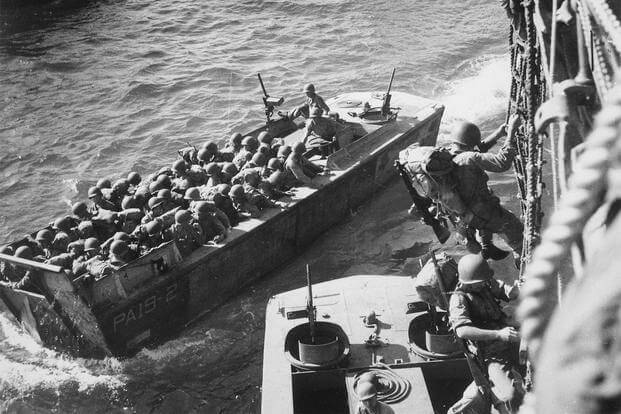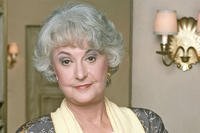My name is Maro P. Flagg, former Chief Pharmacist's Mate of the U.S. Navy who took part in the invasion of Normandy and events before and thereafter. I wish to recall how I happened to go into the service. At the time, I was funeral director and had my own funeral home. I had a family of five children. As I was a graduate from Miami Military Academy in Florida and was also an embalmer.
While we were there, our ship was up in Cardiff, Wales being repaired because of the extensive damage done in the rough crossing of the Atlantic.
It was there that we learned about gas warfare. We were taken into caves and different gases were exposed to us so we would have some idea of what gas warfare would be like. A commander came down from London and taught us about gas warfare.
At that time, I needed to have my watch fixed, so I took it to a jeweler. He said that it would be ready in a fourth night. I said, "In a fourth night I might be dead." So, I kept my watch.
We stayed there for about ten days. Then we took the train again, and we went up to Cardiff, Wales where we took our shipback to Plymouth again and I was transferred here to LST 400, which had come up from Africa and Italy after being in three invasions.
The captain of our new ship was only 26 years old and this was going to be his fourth invasion. Half of the crew were sent home because they were so nervous; you couldn't drop a hammer on the deck or they would go into a fit.
Every night we would get air raids at about 4 o'clock in the morning. We had to go to the general quarters.
I was approximately 30 years old at the time of the invasion. In the mean time as we were there, we made practice landings on the shores of England.
While on the Dart River, plans were made which were called "Operation Tiger". I was to go out on this practice run at night. And it was forty years later before the secret came out to show how fortunate I was that I was not able to take part in this practice run. If I had I probably would not be writing this story today.
I saw the ships after they were totaled with their fan tails blown out by the German E boats. It seemed that the British escorts ran and did not give the protection they should have or this may not have happened. There were over seven hundred and forty soldiers killed in this operation and it was kept a secret from April 28, 1944. Two of the stricken ships were caused to sink within two hours.
At first two of the men aboard these vessels told us about the situation and how the dry run had gotten out of hand and stimulation had taken a bad turn where as the burning ships set off these ships turned to panic.
On June 4, 1944, we went to the Highden Dock to load up small ships for the invasion. We took on trucks called ducks, there were twenty on one of them, they could also swim. We also had twenty one tanks filled with ammunition. There were also half tracks, jeeps, and a hundred men from the 101st airborne division because the weather was bad.
We had to delay in starting for the invasion for twenty four hours. We left on the afternoon of the 5th at four p.m. I was told to get up as I was resting on my bunk, that the war was going by. I looked out to see ship after ship pass by, destroyers, cruisers, battleships, and every type you could imagine. The captain took us out on the deck and showed us a map of where we were going in case we got lost, we'd know where we'd be, approximately. He also gave us a paper copy from Eisenhower as to how difficult the enemy would be and what we were up against. The chaplain offered prayers, and to tell the truth, his knees were really shaking.
They laid down a barrage and it was like the fourth of July. The battleship Nevada was firing over our head and also the Texas was nearby.
The night of the invasion, around midnight, we heard theB-17s go over. Of course, it was a dark cloudy night. The Germans, I don't think, would ever expect anyone to start an invasion in the weather conditions that we started out in. The paratroopers landed and closed the river off, and they fought their way down to the beachhead. They had captured 214 German Prisoners of War, many of which were wounded. It was my duty to put them on a tank deck, take them back to England to treat them for their wounds.
For one example, one German had a hole in his chest. I asked the doctor, "What do we do with him?" He said, "Oh, put some peroxide on him and slap a bandage on him." So I did. I also had charge of feeding the prisoners and passing out the water to the prisoners. In the corners of the tank deck, there were paratroopers with machine guns guarding the prisoners.
We had about 50 paratroopers on our LST on one trip we made across. We were in the worst storm that lasted for three days, which is the worst storm in recorded history for over 60 years. Finally, as we get the beachhead under more control, they landed the troops and they were as glad to get off our ship as we were to be on the ship and not have to go onto shore at that time.
After we loaded the paratroopers, we could still hear the machine guns firing up in the hedgerows. Finally, the storm ended, after three days. The odor was terrible from having so many people aboard the ship with no facilities. We took them back to England to get more supplies. There was a great fear that we would not be able to get back in time to reinforce the troops so that they could continue going forward. We made six trips across the East Channel before the time came when I was to be sent back to Norfolk.














